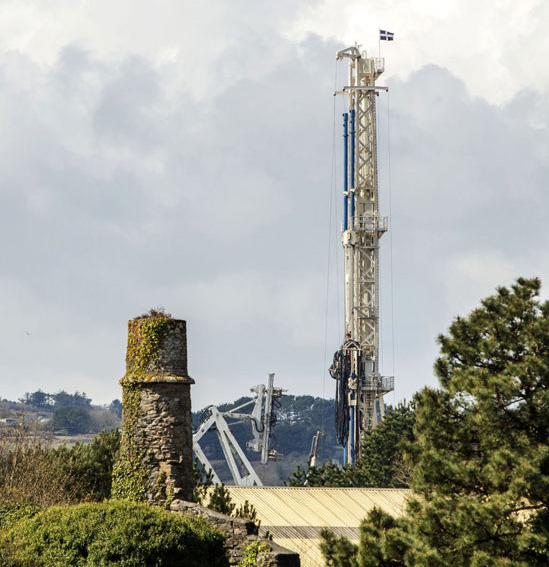Geothermal Engineering Ltd (GEL), the company behind the UK’s first deep geothermal electricity power plant, is today announcing record levels of lithium in its geothermal waters. Recent, third party tests have revealed that there are more than 250 milligrams per litre (‘mg/L’) in the fluid which is the highest concentration ever discovered in geothermal fluids anywhere in the world.
GEL and other partners have also been trialling sustainable, zero carbon methods of removing the lithium from the fluid, so far managing to achieve a 95% extraction rate. Testing has also shown that the concentration magnesium, a metal which can make processing more difficult and expensive, is extremely low. Based on the findings of these tests, GEL is looking at the potential for the production of 4,000 tonnes of lithium per year from the next sites it is planning by 2026.
Lithium is a naturally occurring metal found on almost every continent but is currently mined in South America and Australia. It is then shipped to China for processing into battery-grade lithium. Finally, batteries are sent to Europe to be installed in electric vehicles. The UK currently produces no lithium onshore and the carbon footprint of delivering lithium-ion batteries is significant. The race is on to produce locally sourced, zero carbon lithium. The Faraday Institution, a government-backed body set up in 2017 to promote the battery industry, estimates UK demand for lithium could reach 59,000 tonnes a year of lithium carbonate equivalent by 2035, based on projected growth in domestic battery demand.

Ryan Law, Managing Director of Geothermal Engineering Ltd said:
“Deep geothermal heat and power are already set to help the world reach net zero targets. The addition of lithium production with no carbon footprint or environmental damage will help to drive more geothermal projects forward in the UK and offer more opportunities for green jobs.”
“If the UK is to reach the government target to produce only electric vehicles by 2035, we have to find more sustainable and geopolitically more reliable ways to deliver lithium batteries. Establishing meaningful onshore lithium production in the UK would also encourage a lithium-ion battery-based economy to develop in the UK, and could attract further important inward investment opportunities for Cornwall and the South West.”

United Downs Deep Geothermal Power Project
The UDDGP project is the first geothermal power plant in the UK. It is funded by a mixture of public and private funds to include the European Regional Development Fund, Cornwall Council and Thrive Renewables plc. The aim of the project is to produce power and heat from the hot granite rocks beneath Cornwall at the United Downs Industrial Site near Redruth. Two deep, directional wells have successfully been drilled; the production well to a depth of 5275m and the injection well to 2393m. Both wells have intersected the target Porthtowan Fault Zone located approximately 800m to the west of the site.
Lithium
Geothermal Engineering Ltd (GEL) is moving forward with a trial of a pioneering lithium extraction plant at its United Downs geothermal site in Cornwall.
The pilot plant will use Direct Lithium Extraction (DLE) technology to recover lithium from the geothermal water and will be developed in collaboration with Cornish Lithium Ltd.
We all use lithium in electronic devices, however, we tend not to think about where it comes from and if the extraction process causes any damage to the planet. With the ever-increasing move to electric vehicles, not just domestic cars, lithium is in greater demand than ever before.
Lithium was discovered in Cornwall in 1864 in the hot underground (geothermal) fluid when a sample was taken from a tin mine for analysis. During the Geothermal well testing at the United Downs site, GEL also had samples of the fluid from circa 5km below the surface analysed and were excited to find that the concentrations were some of the highest in the world.
GEL are working in collaboration with Cornish Lithium on a joint venture called Geo Cubed, to trial Direct Lithium Extraction (DLE) technology, using the geothermal water from the deep wells at the GEL United Downs site. The UK Government has invested in the project through the Getting Building Fund which supports the £4m collaboration between the two companies.
DLE technology is in its infancy around the world, however, successful extraction has been reported. DLE is environmentally friendly and once the lithium has been extracted the geothermal fluid is deposited back underground to re-heat. The project will design, procure and commission a pilot plant at the United Downs Deep Geothermal Project site. The aim is to demonstrate that lithium hydroxide, a key component of lithium-ion batteries used in electric vehicles, can be produced in Cornwall from naturally occurring geothermal water with a net zero carbon footprint.
Domestic production of this critical metal is vital for the UK to deliver its zero carbon and clean growth ambitions and the co-production of lithium with geothermal heat and power from the same geothermal source is an exciting opportunity for GEL and Cornwall.
KeyFacts Renewable Energy Directory: Geothermal Engineering
 KEYFACT Energy
KEYFACT Energy